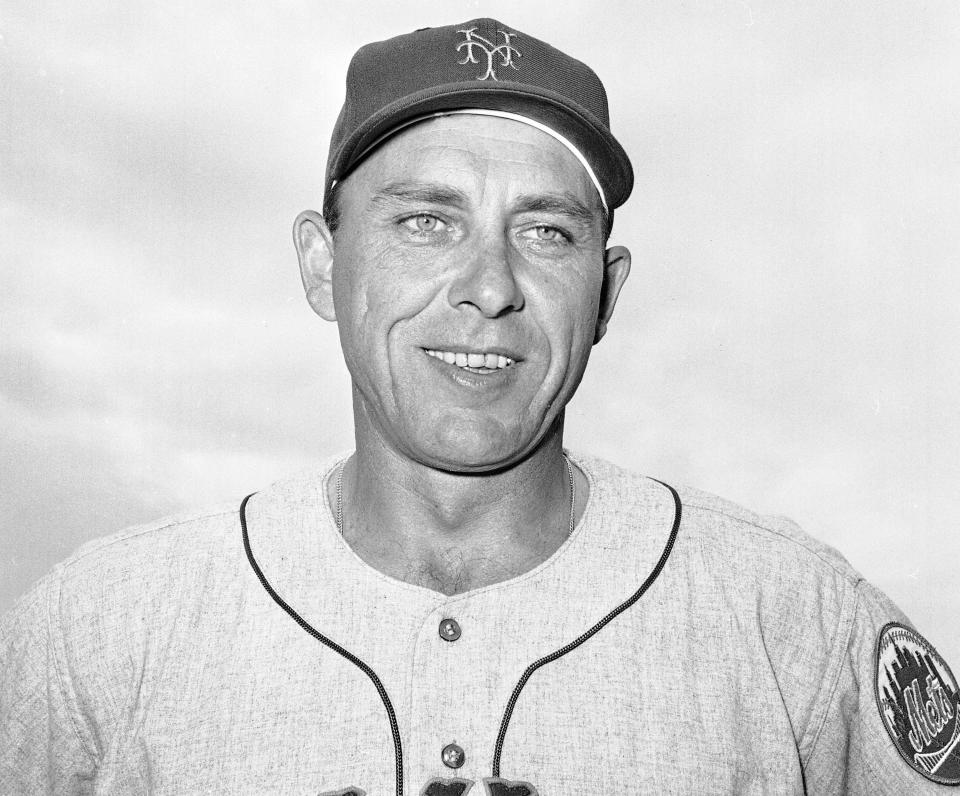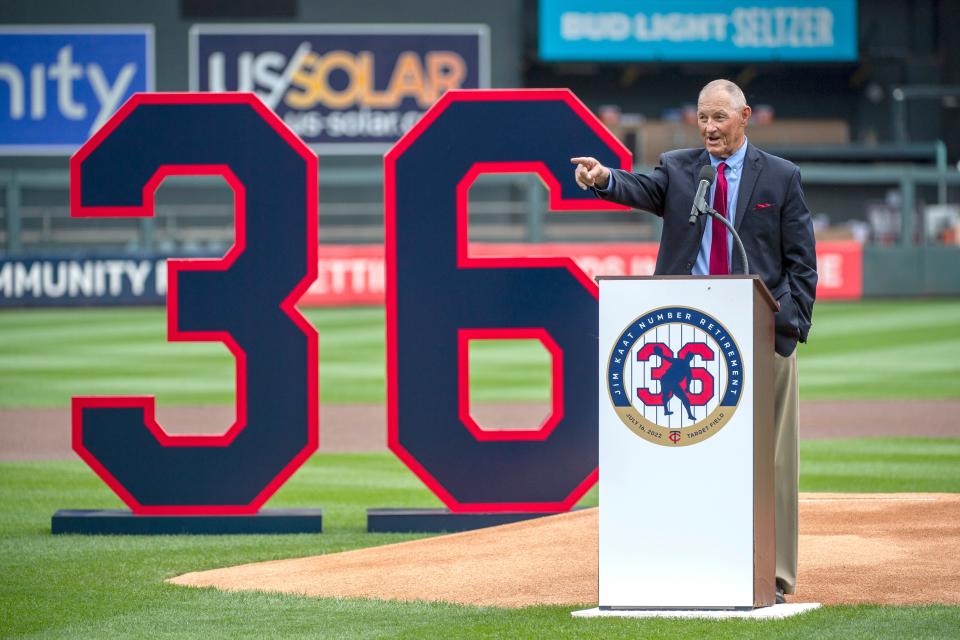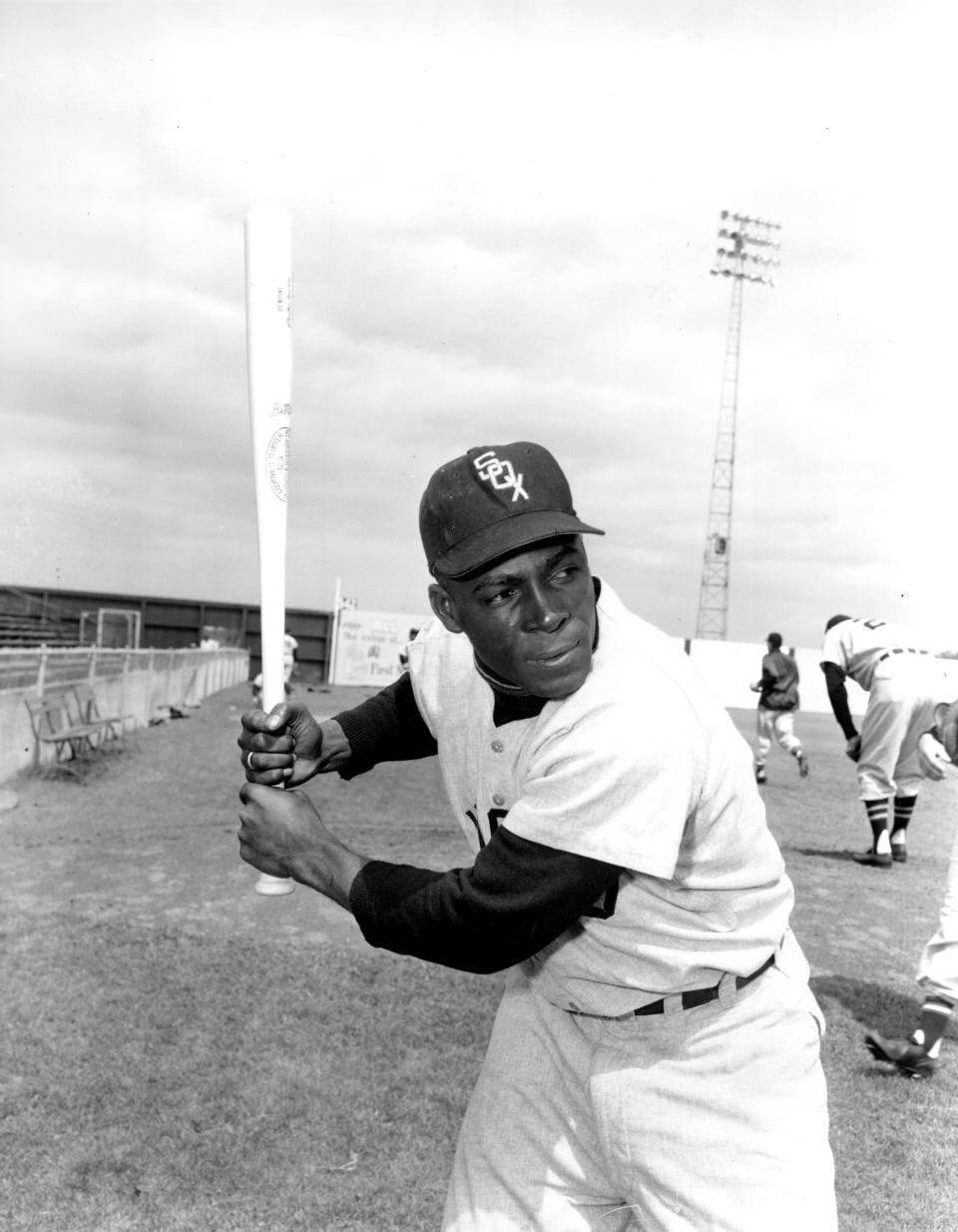Get to know the seven inductees in the Baseball Hall of Fame Class of 2022
The Baseball Hall of Fame Class of 2022 features seven members that tie together more than 150 years of baseball history in a celebration of diversity at the game's highest level.
Boston Red Sox legend David Ortiz; the Brooklyn Dodgers' Gil Hodges; pitcher Jim Kaat; Minnie Miñoso, the first known Black Latino player in the majors; Twins outfielder Tony Oliva; Bud Fowler, the first Black professional player; and Buck O'Neil, the face of Negro League baseball, will be inducted Sunday in Cooperstown, New York.
Ortiz was elected by the Baseball Writers' Association of America, while Hodges, Kaat, Miñoso and Oliva are electees of the Golden Days Era Committee. Fowler and O'Neil were selected by the Early Baseball Era Committee.
Get to know each of the seven members being inducted on Sunday:
WILL BE THERE: Hall of Famers Reggie Jackson, Goose Gossage change minds, attend David Ortiz induction
OPINION: Tony Oliva, Orestes 'Minnie' Miñoso finally get Hall of Fame vote they deserved
David Ortiz
Arguably the player from the Class of '22 that baseball fans will recognize most, Ortiz became a fan favorite for his slugging ability and clutch hits for the Red Sox. Ortiz played 20 seasons (1997-2016) in MLB, 14 with Boston and the other six with the Twins. A 10-time All-Star and seven-time Silver Slugger, Ortiz helped power the Red Sox to their 2004 World Series title, which ended an 86-year championship drought.

He would go on to be a three-time champion, including a World Series Most Valuable Player award in 2013. Known as one of the greatest designated hitters to ever play the game, Ortiz finished his career with a .286 batting average, 541 home runs, 1,768 RBI and a career slugging percentage of .552. He led the league in RBI three times — 2005, 2006 and 2016, his last season in the league — and led the majors in home runs in 2006, with 54. Ortiz's 20 career walk-off hits in the regular season rank third-most in MLB history.
Gil Hodges
Hodges spent 27 years in the majors, as a first baseman and then, later, as a manager. He played 18 seasons (1943-63) with the Dodgers and New York Mets. An eight-time All-Star and three-time Gold Glove winner, Hodges was a part of World Series championships in 1955 and 1959.

Hodges surpassed 20 home runs in a season 11 consecutive years, from 1949-59, and recorded 100 or more RBI in seven consecutive years (1949-55). On Aug. 31, 1950, Hodges became just the second modern-era player to hit four home runs in a single game. He ended his career with a .273 average and 370 home runs with 1,274 RBI. He missed the 1944 and 1945 seasons because he was drafted into the Marines and served 29 months in the Pacific during World War II.
As a manager, Hodges posted a 321-444 record with the Washington Senators (1963-67) and the Mets (1968-71), guiding New York to the World Series title in 1969.
Jim Kaat
In 25 seasons, Jim Kaat compiled a 283-237 record for the Senators, Twins, White Sox, Phillies, Yankees and Cardinals. Kaat's 625 games started ranks 17th all-time and his 4,530.1 innings pitched ranks 25th. In 1966, with the Twins, Kaat led the league with 25 victories and 19 complete games.

His 16 Gold Gloves is tied with Brooks Robinson for second most in history since the award was introduced in 1957. He finished his career with a 3.45 ERA and 2,461 strikeouts. A three-time All-Star, Kaat posted 180 complete games. He later transitioned to the bullpen, where he helped the Cardinals clinch the 1982 World Series.
Minnie Miñoso
An icon for Latin American baseball fans, Miñoso became the first known Afro-Latino to appear in the majors when he did so for Cleveland in 1949. Miñoso, who was born in Perico, Cuba, previously played three seasons in the Negro Leagues, but then went on to play 17 years in the majors with Cleveland, the White Sox, Cardinals and Senators. He was an instant sensation, finishing second in the AL Rookie of the Year award voting in 1951 after he hit .326 with 14 triples and 31 stolen bases. He was a 13-time All-Star and three-time Gold Glove winner.

In his 1998 autobiography, Puerto Rican-born Hall of Famer Orlando Cepeda gave voice to Miñoso's impact, writing he “is to Latin ballplayers what Jackie Robinson is to Black ballplayers. As much as I loved Roberto Clemente and cherish his memory, Minnie is the one who made it possible for all us Latins. Before Roberto Clemente, before Vic Power, before Orlando Cepeda, there was Minnie Miñoso."
Miñoso finished his career with 2,110 hits and a .299 career batting average, adding 1,225 runs, 1,093 RBI and 216 stolen bases.
Tony Oliva
Like Miñoso, Oliva is a native of Cuba, born in Pinar del Río. He played each of his 15 seasons with the Twins and became the first player in MLB history to win the batting crown in his first two full-time seasons, hitting .323 in 1964 and .321 the following year. Oliva won the AL Rookie of the Year award in 1964 and his 374 total bases that season tied a rookie record that still stands today. Oliva led the league in hits in five times in his career.

In 1971, Oliva won the batting title (.337) for the third and final time of his career and also led the league in slugging (.546). He was an eight-time All-Star, each of which came in consecutive seasons (1964-71) and won a Gold Glove in 1966. A knee injury suffered late in the 1971 season derailed his career, though he finished with a .304 batting average, including 220 home runs and 947 RBI.
Bud Fowler
Bud Fowler is a titan in baseball history: He was the first Black professional baseball player. Born in 1858, Fowler faced constant racism from fans and even teammates, leading to his career being far more nomadic than those of his white contemporaries.

Fowler was born John W. Jackson, but according to the Hall of Fame, Fowler himself said he played for teams "based in 22 different states and in Canada." Baseball historians estimate he played in more than a dozen leagues, in places like Binghamton, New York, and Terre Haute, Indiana. According to the Hall of Fame, Fowler was also instrumental in establishing Black baseball leagues across the country.
Buck O'Neil
No one in the Class of 2022 had a longer career in baseball than O'Neil, whose time as a player, manager, scout and executive spanned nearly eight decades. The grandson of slaves, O'Neill was born in 1911 in Carrabelle, Florida, and started playing semipro baseball before playing for the Memphis Red Sox and Kansas City Monarchs of the Negro American League from 1937-48. He missed the 1944 and 1945 seasons because he served in the Navy.

O'Neil was a three-time All-Star and helped the Monarchs win four consecutive pennants and the Negro League World Series in 1942. From 1948-55, O'Neil was the player-manager of the Monarchs and helped identify and develop Ernie Banks. After his stint with the Monarchs, O'Neil signed on as a scout with the Chicago Cubs in 1955. In 1962, the Cubs promoted O'Neil to their coaching staff, making him the first Black coach to appear on an AL or NL roster. O'Neil helped establish the Negro Leagues Museum in Kansas City, Missouri in 1990. O'Neil was posthumously awarded the Presidential Medal of Freedom in 2006 from President George W. Bush. A statue of O'Neil outside the Hall of Fame was dedicated in 2008 and the Buck O’Neil Lifetime Achievement Award was also established then.
Contributing: Bob Nightengale, Cesar Brioso
This article originally appeared on USA TODAY: Baseball Hall of Fame 2022: David Ortiz highlights list of 7 inductees

